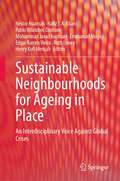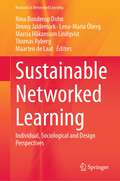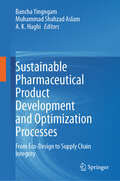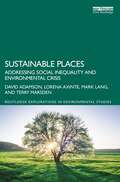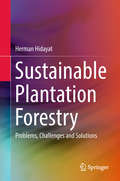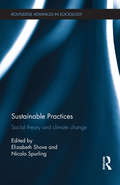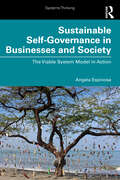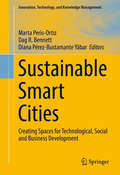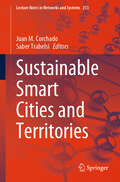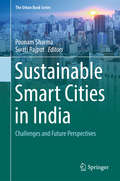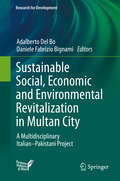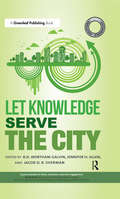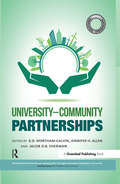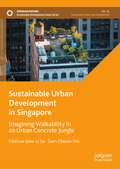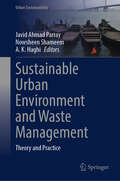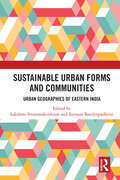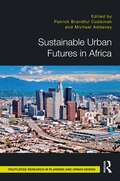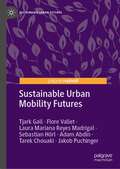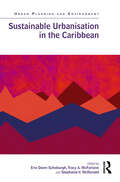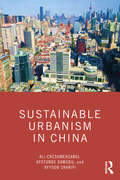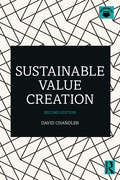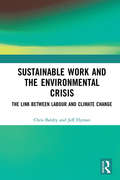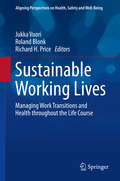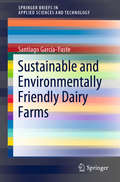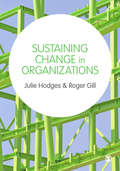- Table View
- List View
Sustainable Neighbourhoods for Ageing in Place: An Interdisciplinary Voice Against Global Crises
by Emmanuel Mogaji Hafiz T. A. Khan Ruth Lowry Nestor Asiamah Pablo Villalobos Dintrans Mohammad Javad Koohsari Edgar Ramos Vieira Henry Kofi MensahThis timely book provides an understanding of how an ageing population can maintain health in the ageing process in their preferred homes and neighbourhoods while coping with global crises of climate change events, infectious diseases, systemic violence, and radical or extreme industrialisation. It is the first-known volume to consider the four crises as health and social threats to healthy longevity from a sustainability perspective. The book is a collection of commentaries, theoretical frameworks, case studies, and empirical evidence that: (1) provides an analysis of how the crises affect neighbourhood attributes and the ability of residents to use them to maintain health while living in their preferred neighbourhoods, and (2) suggests potential interventions for enabling residents to utilise these attributes for health while living at home in contexts experiencing the crises. Contributions are authored by scholars and practitioners from various disciplines including public health, health care, architecture, engineering, human resources development, information technology, and finance. Among the topics covered:The Impact of Crises on Older Adults’ Health and Function: An Intergenerational Perspective A Behavioural Approach to Sustainable Neighbourhoods: A Philosophical Construction of a Friendly NeighbourhoodAssistive Technologies for Ageing in Place: A Theoretical Proposition of Human Development Postulates “Sustainable Ageing” in a World of CrisesSustainable Neighbourhoods for Ageing in Place: An Interdisciplinary Voice Against Global Crises serves as both a primary and secondary text particularly suited for post-graduate level study (e.g., MSc, PhD). Each chapter richly describes events, phenomena and models in a way that fits contemporary curricula for students and instructors in sociology, gerontology, architecture, environmental science studies, sustainability, ageing studies, and public health. Researchers in a broad range of disciplines can use the book as a research guide to design their studies based on models and insights described in its contents. With theoretical frameworks and recommendations from this book, stakeholders can understand what a sustainable neighbourhood is in the context of crises by presenting problems and solutions from different countries and disciplines.
Sustainable Networked Learning: Individual, Sociological and Design Perspectives (Research in Networked Learning)
by Thomas Ryberg Maarten De Laat Nina Bonderup Dohn Jimmy Jaldemark Lena-Maria Öberg Marcia Håkansson LindqvistThis book provides cutting-edge research on networked learning, focusing on issues of sustainability in design for learning, data use, and networked learning connections. It contributes novel theoretical perspectives on networked learning, its role in society and potential for sustainable learning design. It further contributes a set of exemplary empirical cases - exemplary in terms of their innovative learning designs, pedagogical use of technology in connecting learners, and/or critical reflections on implications of utilizing different technologies to support learning. The book is organized into four main sections: 1) Data and datafication, 2) Sustainable learning design, 3) Sociological perspectives on Networked Learning, and 4) Networked learning in times of lockdown. Concluding the book is a final chapter which points to emerging issues within the field of networked learning, based on discussion of perspectives from the chapters The book's focus on the nature of learning and technology-mediated interactions makes it of prime significance to researchers and practitioners in the field of technology-supported teaching and learning.
Sustainable Pharmaceutical Product Development and Optimization Processes: From Eco-Design to Supply Chain Integrity
by A. K. Haghi Bancha Yingngam Muhammad Shahzad AslamThis book offers unparalleled insight into the convergence of sustainability and pharmaceutical product development, with a specific focus on optimization processes. By addressing the urgent demand for more environmentally conscious and efficient strategies in the drug development industry, particularly in an era where the world faces the mounting challenges posed by climate change, the book provides a comprehensive guide for integrating sustainability principles throughout the pharmaceutical product lifecycle, directly contributing to the United Nations Sustainable Development Goals (SDGs), such as SDG 12 (Responsible Consumption and Production) and SDG 13 (Climate Action). The chapters cover key topics, including the application of green chemistry, eco-design principles, sustainable sourcing of raw materials, waste reduction strategies, and the use of renewable energy in pharmaceutical manufacturing processes. Throughout the book, case studies are integrated, offering practical insights and concurrently highlighting the economic and environmental advantages of sustainable practices, thereby addressing skepticism regarding the feasibility and profitability of such initiatives. The book also discusses regulatory considerations, ethical implications, and the challenges and opportunities associated with moving toward more sustainable practices in pharmaceutical development. Importantly, this book seeks to solve the problem of the knowledge gap and lack of practical resources for professionals in the pharmaceutical industry who aspire to implement sustainable and optimized processes. This work consolidates a network of professionals and scholars keenly focused on future sustainability challenges, developing enhancement methodologies, and sharing successful strategies for implementing eco-friendly practices in pharmaceutical sectors worldwide, ultimately contributing to the global effort to achieve the SDGs by 2030. With a focus on pharmaceutical professionals, researchers, academicians, and students, the book serves as a valuable reference for those involved in drug development and process optimization. Policymakers and regulatory bodies might also find it insightful, as it addresses current landscapes, challenges, and future directions in sustainable pharmaceutical product development.
Sustainable Places: Addressing Social Inequality and Environmental Crisis (Routledge Explorations in Environmental Studies)
by Terry Marsden David Adamson Lorena Axinte Mark LangThis book calls for more holistic place-based action to address the social and environmental crisis, deploying the Deep Place approach as one contribution to the toolbox of actions that will underpin the UN Decade of Action towards the Sustainable Development Goals. The authors suggest that ‘place’ is a critical window on how to conceive a resolution to the multiple and overlapping crises. As well as diagnosing the problem (the world as it is), this book also offers a normative advocacy (the world as it could/should be and proposed pathways to get there). A series of ‘Deep Place’ case studies from the UK, Australia, and Vanuatu help to illustrate this approach. Ultimately, the book argues for the need for a real and green ‘new deal’ and identifies what this should be like. It suggests that a new economic order, whilst eventually inevitable, requires radical change. This will not be easy but will be essential given the current impasse, caused, not least by the conjunction of carbon-based, neoliberal capitalism in crisis and the multifactorial global ecological crisis. Ultimately, it concludes that there is a need to develop a new model of ‘regenerative collectivism’ to overcome these crises. This book will be of interest to academics, policy practitioners, and social and climate justice advocates/activists.
Sustainable Plantation Forestry: Problems, Challenges And Solutions
by Herman HidayatThis book discusses sustainable forest management from the perspectives of sociology, anthropology, politics, economics and policy. It examines the roles of governments, private sectors, NGOs, academics and local communities in implementing sustainable plantation forestry, which aims to supply timber for the forestry industry while at the same time reducing global warming. The book also explores the debates on sustainable forest management practices in several countries, and examines the effects of political ecology on plantation forestry as well as the impact of climate change and conservation programs. By analyzing a number of interrelated issues, it offers a valuable resource for all governments, private companies, practitioners, NGOs, academics and students studying forest management and political ecology from a social sciences perspective.
Sustainable Practices: Social Theory and Climate Change (Routledge Advances in Sociology)
by Elizabeth Shove Nicola SpurlingClimate change is widely agreed to be one the greatest challenges facing society today. Mitigating and adapting to it is certain to require new ways of living. Thus far efforts to promote less resource-intensive habits and routines have centred on typically limited understandings of individual agency, choice and change. This book shows how much more the social sciences have to offer. The contributors to Sustainable Practices: Social Theory and Climate Change come from different disciplines – sociology, geography, economics and philosophy – but are alike in taking social theories of practice as a common point of reference. This volume explores questions which arise from this distinctive and fresh approach: how do practices and material elements circulate and intersect? how do complex infrastructures and systems form and break apart? how does the reproduction of social practice sustain related patterns of inequality and injustice? This collection shows how social theories of practice can help us understand what societal transitions towards sustainability might involve, and how they might be achieved. It will be of interest to students and researchers in sociology, environmental studies, geography, philosophy and economics, and to policy makers and advisors working in this field.
Sustainable Self-Governance in Businesses and Society: The Viable System Model in Action (Systems Thinking)
by Angela EspinosaSustainable Self-Governance in Businesses and Society offers a sound introduction to Stafford Beer’s Viable System Model (VSM) and clarifies its relevance to support organisational sustainability and self-governance. While the VSM has been known since the early 1980s, it hasn’t been always easy to understand and to apply. It explains the self-transformation methodology to analyse the way organisations manage (or not) their complexity and govern themselves. The work is supported by multiple examples of application in organisations of all scales – from small to multi-national corporations and from organised social networks to communities and national organisations. It clarifies the relevance of Beer’s theory to support systemic learning and change in organisations, and to coach them to self-organise and self-govern. Readers interested in further understanding insights from complex systems and cybernetics theories for designing and transforming organisations will benefit from this book, as it works to offer very detailed insights on how to put the VSM theory into practice. It clarifies how it improves adaptive capabilities, agile and self-regulated structures, more capable of fully implementing corporate sustainability strategies and self-governing themselves. The chapters provide key reading for managers, consultants, practitioners, and post-graduate students working in organisational transformation, governance, and sustainability.
Sustainable Smart Cities
by Marta Peris-Ortiz Dag R. Bennett Diana Pérez-Bustamante YábarThis volume provides the most current research on smart cities. Specifically, it focuses on the economic development and sustainability of smart cities and examines how to transform older industrial cities into sustainable smart cities. It aims to identify the role of the following elements in the creation and management of smart cities: * Citizen participation and empowerment * Value creation mechanisms * Public administration * Quality of life and sustainability * Democracy * ICT * Private initiatives and entrepreneurship Regardless of their size, all cities are ultimately agglomerations of people and institutions. Agglomeration economies make it possible to attain minimum efficiencies of scale in the organization and delivery of services. However, the economic benefits do not constitute the main advantage of a city. A city's status rests on three dimensions: (1) political impetus, which is the result of citizens' participation and the public administration's agenda; (2) applications derived from technological advances (especially in ICT); and (3) cooperation between public and private initiatives in business development and entrepreneurship. These three dimensions determine which resources are necessary to create smart cities. But a smart city, ideal in the way it channels and resolves technological, social and economic-growth issues, requires many additional elements to function at a high-performance level, such as culture (an environment that empowers and engages citizens) and physical infrastructure designed to foster competition and collaboration, encourage new ideas and actions, and set the stage for new business creation. Featuring contributions with models, tools and cases from around the world, this book will be a valuable resource for researchers, students, academics, professionals and policymakers interested in smart cities.
Sustainable Smart Cities and Territories (Lecture Notes in Networks and Systems #253)
by Juan M. Corchado Saber TrabelsiThis book constitutes the proceedings of this year’s Sustainable Smart Cities and Territories International Conference (SSCt 2021), held in Doha, Qatar, from the 27th to the 29th of April 2021. The SSCt 2021 is an open symposium that brings together researchers and developers from academia and industry to present and discuss the latest scientific and technical advances in the fields of Smart Cities and Smart Territories. It promotes an environment for discussion on how techniques, methods, and tools help system designers accomplish the transition from the current cities towards those we need in a changing world. The program includes keynote abstracts, a main technical track, two workshops, and a doctoral consortium. The symposium is organized by the Texas A&M University at Qatar. We would like to thank all the contributing authors, the members of the Local Committee, Scientific Committee, Organizing Committee, and the sponsors (Texas A&M University of Qatar, AIR Institute and the IoT Digital Innovation Hub) for their hard work and dedication.
Sustainable Smart Cities in India
by Poonam Sharma Swati RajputThis book presents fundamental and applied research aimed at the development of smart cities across India. Based on the exploration of an extensive array of multidisciplinary literature, this book discusses critical factors of smart city initiatives: management and organization, technology, governance, policy, people and communities, economy, infrastructure, and natural environment. These factors are broadly covered under the integrative framework of the book to examine the vision and challenges of smart city initiatives. The book suggests directions and agendas for smart city research and outlines practical implications for government professionals, students, research scholars and policy makers. A lot of work is happening on smart cities as it is an upcoming area of research and development. At international level, and even in India, the concept of smart cities concept is a hot topic at universities, research centers, ministries, transport departments, civic bodies, environment, energy and disaster organizations, town planners and policy makers. This book provides ideas and information to government officials, investors, experts and research students.
Sustainable Social, Economic and Environmental Revitalization in Multan City
by Daniele Fabrizio Bignami Adalberto Del BoThis book describes six months of initial intensive activities within a motivating multidisciplinary project to achieve sustainable social, economic, and environmental revitalization in the historic core of Multan City, Pakistan. The project is managed by Fondazione Politecnico di Milano within the framework of the "Pakistan-Italian Debt for Development Swap Agreement" and has five components: a livelihood improvement program, a living conditions improvement program, revitalization of physical assets, establishment of a Pakistan-Italian resource centre in Multan, and an Italian collaboration program for training and capacity building. All aspects are covered in this book, which provides a comprehensive account of progress in this excellent example of cross-cultural cooperation between a Western and an Eastern country in regenerating an historic populated site.
Sustainable Solutions: Let Knowledge Serve the City
by B.D. Wortham-Galvin Jennifer H. Allen Jacob D.B. ShermanPortland, Oregon. Sustainability might not seem glamourous, but Portland is making a name for itself as one of the most sustainable cities in the world. Whether you’ve heard about the farmers’ markets, the cycle-friendly streets or the ongoing efforts to balance livability and equity, Portland is leading the way in urban sustainability: this book helps us understand how it achieves this.A critical component of Portland’s success is collaboration between different communities and institutions; the Sustainable Solutions series examines higher education’s role in these partnerships. In exploring how best to “let knowledge serve the city”, Portland State University translates its founding motto from mere words to applied research and action.This first volume examines different approaches to collaborative work that PSU has taken, both within the university and with community partners: how have barriers been overcome between different areas of study, between academia and the public, and why is bridging these divides so important? It also introduces the themes of the engaged university, social justice, climate change and sustainable economic development, which shape PSU’s work.Let Knowledge Serve the City is ideal for anyone seeking best practice in connecting students and universities with the needs of local communities. From public interest design and student leadership, to food justice and age-friendly development, authors combine academically rigorous theories of sustainability and community-university partnerships with lessons learned on how to realize ideals of sustainable development.
Sustainable Solutions: University–Community Partnerships (Sustainable Solutions Ser. #2)
by B.D. Wortham-Galvin Jennifer H. Allen Jacob D.B. ShermanWhat is the role of the university? Current systems may stress research output, but Wortham-Galvin, Allen, and Sherman seek to re-establish the importance of teaching and service in the work of the 21st-century university. The Sustainable Solutions series shares Portland State University’s experience of community-engaged teaching and research. With a focus on sustainability, we see that such collaboration is vital to making Portland one of the world’s most sustainable cities.Volume 2, University–Community Partnerships, builds on the themes introduced in Volume 1, Let Knowledge Serve the City, to explore how these partnerships play out in practice. Covering 13 projects, which range from supporting local artisans and researching food access, to sharing Indigenous history and decolonizing perceptions of knowledge, readers receive pragmatic advice on working with community organizations. Authors also offer critical reflection on how theories of engagement have structured PSU’s work and how their findings impact our very understanding of partnership.This reader-friendly text provides an ideal introduction to anyone wishing to learn more about models of effective collaboration and how to put these into practice. Explained through the context of specific projects, the book offers both inspiration and practical guidance to anyone — in local government, academia, or the third sector — looking to set up productive community–university partnerships.
Sustainable Urban Development in Singapore: Imagining Walkability in an Urban Concrete Jungle (Sustainable Development Goals Series)
by Melissa Liow Li Sa Sam Choon-YinThis book offers theoretical and practical insights into land use, transport, and national policies in one of world’s well-known urban concrete jungle, none other than the Singapore city. The emphasis is situated on Singapore’s attempt to promote walking and cycling. Greater appreciation of walkability thrives on Singapore’s rich history, green city, people and the gastronomic kopitiam and hawker culture. The book offers a comprehensive coverage of walkability as a crucial component of urban design to reduce vehicular congestion with the associated carbon emissions, foster a healthy lifestyle and community participation and create jobs to help the economy. A high income per capita and an aging society, lessons drawn from Singapore’s experience will be useful to other societies. Scholars in sustainable tourism field, urban planners, government bodies, tourist boards, entrepreneurs, national parks board, residents, and inbound travellers will benefit from reading the book.
Sustainable Urban Environment and Waste Management: Theory and Practice (Urban Sustainability)
by Javid Ahmad Parray A. K. Haghi Nowsheen ShameemThis very unique research-oriented edited collection introduces waste and pollution treatment methods that can be adopted at local and international levels and examines appropriate resource management strategies for environmentally related issues. It aims to highlight the important role of education for environmental sustainability, in particular the area of urban waste management. Presenting the latest research topics innovative ideas to educate future citizens regarding sustainable development of our planet, it is of interest to readers who are involved in education, policy, science, and technological innovation for urban waste management. Education and awareness in the field of waste management is significantly important from a global perspective of resource management. The aim of this edited collection is creating an interdisciplinary platform for researchers and practitioners to present and discuss the most recent innovations, trends, and concerns as well as practical challenges encountered and solutions adopted in the fields of Environmental Science. This new book explores the crucial nexus between innovative solutions for waste management, and environmental sustainability in an edited collection. This comprehensive book provides a holistic investigation of the most recent inventions, advancements, and breakthroughs in waste management as the need for solutions to the environmental pollution problem becomes more urgent on a global scale. The book investigates the diverse environmental effect of environmental pollution and emphasizes how urgent it is to resolve the ecological costs of waste contamination.
Sustainable Urban Forms and Communities: Urban Geographies of Eastern India
by Sumana Bandyopadhyay Lakshmi SivaramakrishnanThis volume discusses the patterns and trends of urbanization in West Bengal - one of the most urbanized states of India in the early part of the 20th Century. It focuses on the emerging urban landscapes of the state and neighbouring areas on building sustainable urban units and sustainable communities. The book explores the changing urban geographies of the emerging towns of the state and discusses how proper governance can help them to change into sustainable urban units. It presents the historical context of urbanization of West Bengal and traces the factors responsible for the urban primacy of the state. It discusses topics such as the development of the spatial patterns and urbanization, spatial trends of urban growth using remote sensing and GIS techniques, well-being and resilience in the urban society, impact of urbanization on the health status of its citizens, and decentralized governance for inclusive and sustainable development of cities. It also focuses on urban growth, land-use change and its impact on the urban environment. Based on empirical research, this book will be useful for students, teachers and researchers of geography, urban geography, urban studies, urban development and planning, regional planning urban sociology, politics, and urban economics. It will also be of interest to geographers, urban planners, community of geographers, professionals engaged in the discipline, and those interested in the urban geography of West Bengal and eastern India.
Sustainable Urban Futures in Africa
by Patrick Brandful CobbinahSustainable Urban Futures in Africa provides a variety of conventional and emerging theoretical frameworks to inform understandings and responses to critical urban development issues such as urbanisation, climate change, housing/slum, informality, urban sprawl, urban ecosystem services and urban poverty, among others, within the context of the sustainable development goals (SDGs) in Africa. This book addresses topics including challenges to spatial urban development, how spatial planning is delivered, how different urbanisation variables influence the development of different forms of urban systems and settlements in Africa, how city authorities could use old and new methods of land administration to produce sustainable urban spaces in Africa, and the role of local activism is causing important changes in the built environment. Chapters are written by a diverse range of African scholars and practitioners in urban planning and policy design, environmental science and policy, sociology, agriculture, natural resources management, environmental law, and politics. Urban Africa has huge resource potential – both human and natural resources – that can stimulate sustainable development when effectively harnessed. Sustainable Urban Futures in Africa provides support for the SDGs in urban Africa and will be of interest to students and researchers, professionals and policymakers, and readers of urban studies, spatial planning, geography, governance, and other social sciences.
Sustainable Urban Mobility Futures (Sustainable Urban Futures)
by Tjark Gall Flore Vallet Laura Mariana Reyes Madrigal Sebastian Hörl Adam Abdin Tarek Chouaki Jakob PuchingerThis book provides a unique perspective on urban mobility focusing on past challenges and future trends. The book enables discussions of pathways towards sustainable and people-centred urban mobility building on existing concepts and introducing novel methods and consideration of future research. In particular, the book provides an overview of trends, design methods, and projects combining foresight and agent-based modelling to better integrate active mobility in Mobility-as-a-Service, assess impacts of automated vehicles in Paris, and compare multiple solutions in Cairo. The book provides a range of multidisciplinary concepts and methods that will be invaluable to both researchers in the field and students taking relevant courses.
Sustainable Urbanisation in the Caribbean (ISSN)
by Stephanie V. McDonald Dawn Schoburgh, Edited by ErisSustainable Urbanisation in the Caribbean critically examines the socio-geographic context of island states, prioritising the nuanced experiences of Caribbean island states and territories that are largely considered small island developing states (SIDS), against the backdrop of the UN Sustainable Development Goals (SDGs).Increases in urban density place enormous pressure on existing infrastructures and natural resources, exacerbating social inequalities and environmental risks. While the UN SDGs aim to mitigate these risks, the reality of implementing these goals in the context of SIDS is complex. Whereas Sustainable Urbanisation in the Caribbean does not claim to be a comprehensive assessment of policy responses to the SDGs, this edited volume seeks to generate problem-focused, policy-relevant, demand-driven research, thereby permitting the geographical contexts of island states to contribute to the development of proper causal theory about sustainable urbanisation.This book will be of interest to students of public policy, urban sustainability and climate change, as well as government policy analysts, development practitioners, urban planners and UN agencies working in SIDS.
Sustainable Urbanism in China
by Ali Cheshmehzangi Ayyoob Sharifi Ayotunde DawoduSustainable Urbanism in China explores the notion of "Sustainable Urbanism" by considering the role sustainable neighborhood planning plays in the larger picture of sustainable urbanism and suggests innovations and best practices that are either developed or adopted by China. These are narrated as lessons learnt for other countries where we see similar trends of development patterns or emerging practices. Through various explorations of challenges, paradigms, and innovations of urban sustainability, this book highlights how planning, policy, and design are forming and reforming in the context of China. These are offered through a set of guidelines and pathways for urban sustainability at the scale of neighborhoods/communities or districts in a wider context of urban environments, as well as strategies for planners, developers, policy makers, and educators in the field of the built environment. Through a comprehensive overview of urban sustainability practices in China, this book investigates 12 case study projects. These comprehensive explorations should in turn help construct the future directions of China’s sustainable urban development and provide innovative pathways of sustainable urbanism in China and around the globe.
Sustainable Value Creation: Stakeholders, Globalization, And Sustainable Value Creation
by David ChandlerThe framework presented in this book, Sustainable Value Creation, is the result of more than twenty years thinking and writing at the intersection of two subjects, strategy and CSR. I teach strategy and I think about CSR, almost constantly. Given my academic home in the business school, I appreciate the importance of markets and the ability of their essential actors (for-profit firms) to create value. Equally, of course, I see the ability of firms to destroy value, on an all-too-frequent basis. As such, I have spent a lot of time thinking about how to promote the beneficial work firms do and eradicate the harm. The result is this book: a framework through which managers can understand the essential purpose of the for-profit firm, the most powerful entity we have devised to drive societal progress. At its core, this book is structured around the ten principles that define Sustainable Value Creation. The foundation for these principles is a pragmatic philosophy, oriented around stakeholder theory and designed to appeal to managers skeptical of existing definitions of CSR, sustainability, or business ethics. It is also designed to stimulate thought within the community of academics committed to these ideas, but who approach them from more traditional perspectives. Ultimately, therefore, this book aims to reform both business practice and business education. By building a theory that redefines CSR as central to everything the firm does (as opposed to peripheral practices that can be marginalized), these ten principles redefine how firms approach each of their operational functions, but also how these subjects should be taught in universities worldwide. As such, this book will hopefully be of value to instructors as a complement to their teaching, students as a guide in their education, and managers as a framework to help them respond to the complex, dynamic context that they are expected to navigate every day.
Sustainable Work and the Environmental Crisis: The Link between Labour and Climate Change
by Jeff Hyman Chris BaldryCompared to 20 years ago, the jobs many people do today are increasingly characterised by low pay and insecurity, while countless others cope with workplace stress and ill-health. At the same time the consequences of our current model of economic activity are creating dangerous and critical changes in the planet’s climate. Until recently debates around these two issues have had little contact with each other. This book demonstrates that there are definite and complex connections between degraded jobs and a degraded environment, that neither the dominant economic model nor the rate at which we exploit the planet’s resources are sustainable and that the limits for both may be reached sooner rather than later. By bringing together insights from critical thinkers in a range of disciplines, the book discusses the requirements and characteristics for work to be at the same time economically, socially and environmentally sustainable and examines the potential for alternative routes to sustainable work in policies and actions that support both the natural environment and worker well-being. The book will be of interest to researchers, academics and students in the fields of HRM, labour studies, employment relations, sociology, environmental studies and sustainability. It is particularly relevant for those focusing on the link between labour and climate change. It is also highly relevant to policymakers, trade unions and NGOs looking at decent work and sustainability.
Sustainable Working Lives
by Jukka Vuori Roland Blonk Richard H. PriceThe purpose of this volume is to describe the impact of the increased demand for flexibility on employees and its impact on their individual work life trajectories and health. The volume offers concrete examples of interventions aimed to find innovative ways of sustainable work careers for today's workers. We focus on the school to work transition, job insecurity, job loss and re-employment and retirement. The interventions described offer strategies for implementing support in employment contracts, increasing preparedness of individual employees with public education programs or developing work arrangements and support systems in work organizations.
Sustainable and Environmentally Friendly Dairy Farms (SpringerBriefs in Applied Sciences and Technology)
by Santiago García-YusteSustainable and Environmentally Friendly Dairy Farms presents an innovative environmental proposal. While chiefly focusing on dairy farms, the environmental solution it describes is applicable to the entire livestock sector. The book is divided into five chapters, the first of which addresses the carbon footprint of dairy farms. Chapter two provides an overview of the animal production system, focusing on the physiology of the ruminant stomach and the greenhouse gases emitted by dairy cows. In turn, the third chapter covers dairy farm systems, explaining both intensive and extensive husbandry systems. The book’s final two chapters present the-state-of-art in CO2 capture, and describe a new and innovative CO2-RFP strategy. Given its scope, the book will be of interest to chemists, biologists, biotechnologists, and researchers active in agriculture and food-related areas, as well as those working in the food and dairy industry.
Sustaining Change in Organizations
by Roger Gill Julie HodgesIndispensable to understanding change, this unique text provides a comprehensive examination of how change can be sustained within organizations today. Featuring critical insights into theoretical concepts and current international examples, the book provides an accessible way for students to enhance their understanding and develop the crucial skills need to be successful when managing and leading change in organisations. Key Features: Synthesizes what is known about change in organizations and then provides practical ways of sustaining it Contains an international range of case studies and interviews which link theory to practice throughout Explores key contemporary topics such as power, politics, ethics and sustainability for an enhanced understanding of current debates and issues Activities, discussion questions and further reading in each chapter test your understanding of the key concepts and reinforce your learning End of book Glossary defines key terms, for those new to studying change. Comes with access to additional resources for students and lecturers including relevant SAGE journal articles to encourage wider reading
